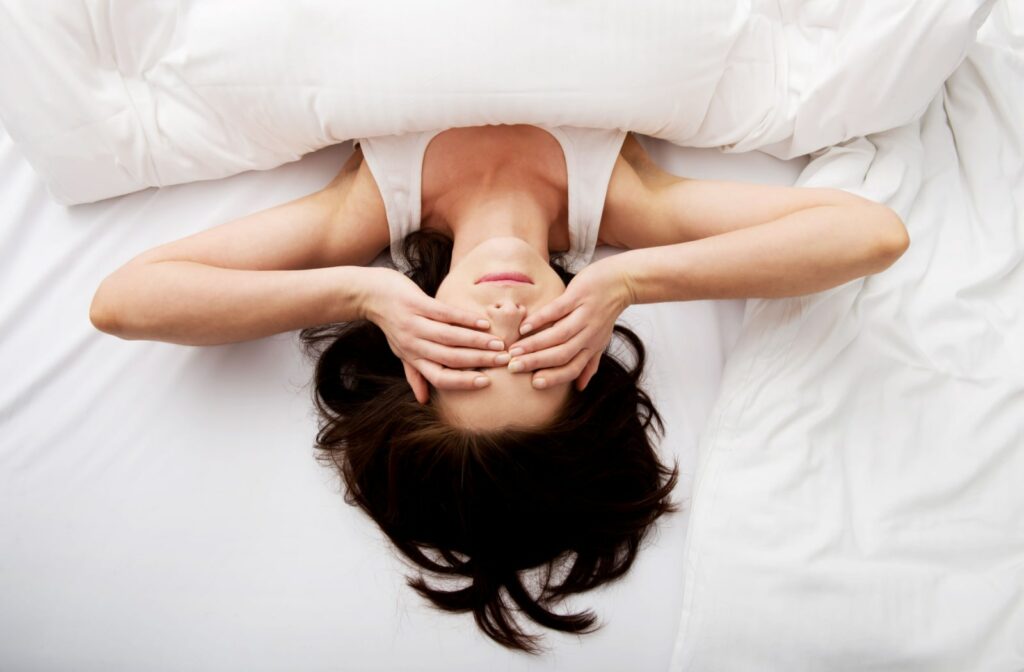Waking up with a burning and dry sensation in the eye is a surefire way to make your morning more difficult than it has to be. The irritation, the discomfort, the blurry vision—it’s probably dry eye disease. What causes this condition?
Dry eyes in the morning can be caused by several potential problems. Your sleep environment plays a big part, along with how well you sleep. Allergies, medication, and even medical conditions like nocturnal lagophthalmos can contribute as well. If you frequently experience dry eyes in the morning, visit your optometrist to discuss treatment.
What Is Dry Eye Disease?
If you’ve ever had a burning sensation in your eye, almost like there’s a piece of sand trapped under your eyelid, you were probably experiencing the effects of dry eye disease. It’s a lot more common than most may think, affecting millions of people every year, and is caused by an issue with your tear production.
Your eye produces a hydrating tear film which is made up of three major components:
- Mucus, which keeps the tear securely attached to the surface of the eye.
- Water, which makes up most of the tear and helps flush away contaminants while hydrating the eye.
- Oils, which prevent the tear from evaporating too quickly and provide a smooth outer surface for the tear.
When a problem develops with one of these layers, the tears can’t properly do their job. Either the tears are too poor quality, or the eye can’t produce enough tears in general. Either way, the tear film becomes imbalanced, and the eye is no longer properly protected.
What Causes Dry Eye Disease?
Your eyes are extremely sensitive, so this imbalance of your tear film can be caused by plenty of different potential factors. These include:
- A particularly dry, windy, or smoky environment.
- Hormonal changes, particularly during pregnancy or as a result of thyroid disorders.
- Certain medications, like antihistamines or antidepressants, that can affect tear production.
- Aging, as natural tear production tends to decrease with age.
- Autoimmune conditions, like Sjogren’s syndrome, that can affect tear production.
Because dry eye disease can be caused by such a wide range of potential problems, it’s important to learn how to recognize the early signs and symptoms of dry eye.

How to Tell if You Have Dry Eye Disease
So how do you tell if you have dry eye? Typically, you can recognize this condition by a burning and irritating sensation. It feels like the surface of the eye is extremely inflamed and irritated. You also may experience:
- A stinging, scratchy, or burning sensation in your eyes
- Stringy mucus in or around your eyes
- Increased eye irritation from smoke or wind
- Sensitivity to light
- Eye redness
- A sensation of having something in your eyes
What Can Cause Morning Dry Eye?
Your sleep cycle is one of the most important processes in your body. While you’re sleeping, your body is repairing damaged cells, consolidating memories, and resting up from the day’s activities. But for your eyes, it can be a bit of a different story.
When you’re asleep, you’re not producing tears as often. This lack of moisture can cause your eyes to dry out. And since your eyelids are closed while you sleep, they can’t spread the tears over your eyes as efficiently.
Your sleeping environment plays an extremely big part in dry eye development—if you sleep near a fan, air conditioner, or heating unit, the air circulation can cause dry, gritty sensations. Using a humidifier can help to keep your sleeping environment comfortable for your eyes.
However, morning dry eye can also be caused by other factors, including:
- Medications, like antihistamines, decongestants, and antidepressants
- Improper usage of contact lenses
- Inflammation in the eyelids due to conditions like blepharitis
- Hormonal changes
- Nutritional deficiencies
In fact, there’s even a condition called nocturnal lagophthalmos where your eyes don’t fully close while you sleep. This leads to your eyes drying out overnight. Because morning dry eye can have so many varying causes, it can help to visit your optometrist—they can examine your eyes to determine what’s causing your dry eyes.
How to Fix Morning Dry Eye
If you often deal with dry eyes in the morning, there’s some good news: you can take several steps to reduce the risk of these feelings. It can help to:
- Adjust your sleeping environment by aiming any fans, air conditioners, or heaters away from your face to avoid air circulation.
- Use a humidifier to make the room more comfortable for your eyes.
- Use an eye mask while sleeping to protect your eyes.
- Wash your eyes before bed to remove bacterial buildup.
- Stay hydrated, as this plays a big part in healthy tear production.
- Use eye drops when needed to find relief.
And don’t forget to regularly visit your optometrist! Regular comprehensive eye exams are one of the easiest ways to take care of your eyes.
When to See Your Optometrist About Your Dry Eyes
If you find yourself waking up with dry eyes, come see us at Total Focus Optometry. Our team is here to help you! Whether you want to try dry eye therapy, schedule an eye exam, or learn more about why dry eyes can develop, we’ve got the answers. Book an appointment with our team, and let’s work together to help you find relief!



